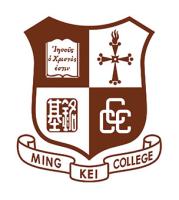| Language Policy |
Since the establishment of our school in 1967, English has been adopted as the medium of instruction. All subjects are taught in English except for the following: Chinese Language, Chinese History, Putonghua, Religious Education, Citizenship and Social Development, Tourism and Hospitality Studies, Physical Education (DSE). Our school has provided an English-rich environment to our students. School announcements, morning prayers and most of the school major events are conducted in English. |
| Learning and Teaching Strategies |
The school follows closely its mission of "providing a holistic education for all students" and the general direction of curriculum reform when designing its formal and informal curricula, taking into consideration of the resources available, the strengths of staff and the needs of students. The school has joined the Integrated Education Scheme and adopted a "Whole School Approach" to implement Integrated Education. School-based curriculum is developed. With the help of subject department heads, teachers are given full discretion to undertake curriculum tailoring for respective subjects across all levels to meet the diverse learning need of students. All teachers are strongly encouraged to use IT in their teaching. These measures help to improve the learning effectiveness of students. |
| School-based curriculum |
1. Electives: 3X. Our school collects secondary three students' opinion on the HKDSE electives through seminars and surveys.<br> 2. Curriculum highlights: Students can choose three electives from a variety of subjects. They are not restricted to Arts, Science or Commercial stream. The DSE electives combination depends on the subject selection survey done in S.3. Our school offers 15 elective subjects, including Mathematics Extended Part Module 1 (M1) and Module 2 (M2). Besides traditional academic subjects, our school also offers Visual Arts, Music and Physical Education as elective subjects for the HKDSE. Students can also choose to study Applied Learning when they are in S.5. |
| Approach to Catering for Learner Diversity |
S.1 to S.3 students are streamed in English Language and Mathematics according to their ability and class size is smaller. This helps to enhance students' learning effectiveness. |
| Approach to Integrated Education |
The school has adopted the ‘Whole School Approach to Integrated Education’ since the 2000-2001 school year. The Integrated Education Committee has been set up to cater for the needs of the SEN students. Individual Education Planning Conferences for the SEN students are held to review their academic progress, reduce their academic pressure and improve their social skills at school. There are special examination arrangements for the SEN students. For example, for the visually-impaired students or students with special learning difficulties, their examination time is extended. At peer level, some students are trained to serve as “Integrated Education Ambassadors”, who provide assistance to the SEN students and conduct activities to promote a caring culture at school. |
| Education Support for Non-Chinese Speaking (NCS) Students |
|
| Home-School Co-operation |
Parents' seminars, workshops and various activities are organized throughout the year. Parents' Day is held after the first term examination. |
| School Ethos |
Students maintain harmonious and cooperative relationship and get along well with their fellow classmates. Students are encouraged to join various service programmes to serve their neighbours and the society so as to live out the school motto of "It is more blessed to give than to receive". |
| School Development Plan |
To implement measures to enhance students' language skills and learning ambience; to make effective use of various reading schemes and help arouse students' interest in reading; to make room for teachers and students in learning and teaching, so as to enhance the students' learning effectiveness; to implement measures to enhance national education and moral and civic education; to continue to implement the Integrated Education Scheme; to establish a self-evaluation culture conducive to school improvement, especially in teaching, learning and administration. |
| Teacher Professional Training and Development |
To make room for teachers' continuing professional development and encourage teachers to attend seminars/workshops in relation to pedagogy and curriculum development of subjects concerned to improve learning and teaching effectiveness. |
| Life-wide Learning |
There are over 40 clubs, training courses and school teams, such as Ceramics Club, Fencing Team and indoor rowing training course. There is an award scheme to encourage students to develop a balanced school life in the moral, intellectual, physical, social, aesthetic and religious aspects. Credit points will be given according to students' participation performance in the activities. Activities in which students participated and awards which they obtained will be recorded in their respective Non-academic Reports. The Non-academic Report will be issued together with the Academic Report to parents at the end of the school year. |
